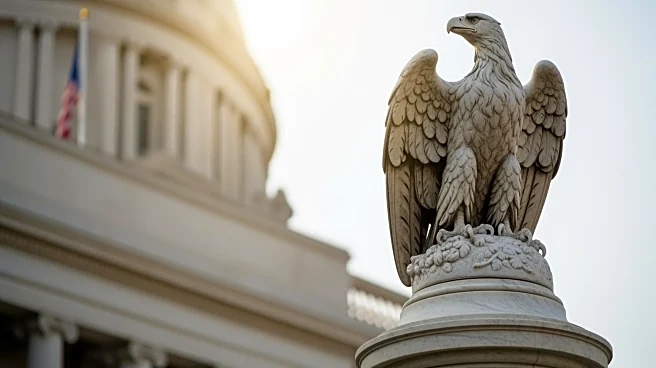What's Happening?
The White House has cited historical precedents to justify President Trump's decision to redirect Pentagon funds to pay U.S. troops during the ongoing government shutdown. This move has sparked criticism
for potentially sidestepping Congress' constitutional control over federal spending. The shutdown began on October 1 after Senate Democrats refused to pass a funding measure without guarantees to extend Affordable Care Act premium subsidies. The White House Office of Management and Budget issued a memo referencing past presidents, such as George Washington and John F. Kennedy, to support the repurposing of unobligated defense funds. President Trump issued orders on October 11 and 15 to use available funds to prevent troops from missing paychecks, moving approximately $8 billion from Pentagon research and development accounts. Legal experts are debating the compliance of this action with the Antideficiency Act.
Why It's Important?
The decision to redirect Pentagon funds during the shutdown is significant as it highlights the ongoing tension between the executive branch and Congress over budgetary control. By using historical examples, the administration aims to justify its actions, potentially setting a precedent for future executive decisions during fiscal impasses. This move could impact military readiness and the ability of the Armed Forces to operate effectively, as stated in the administration's directive. Critics argue that it undermines the legislative branch's authority over federal spending, raising concerns about the balance of power in U.S. governance. The situation also reflects broader political struggles, with each side accusing the other of refusing to negotiate, affecting public policy and government operations.
What's Next?
The administration's actions during the shutdown, including attempts to lay off federal workers and withhold funds from the Army Corps of Engineers, are likely to face legal challenges and political pushback. A judge has temporarily blocked the layoffs, and the withholding of funds largely affects Democrat-led states, which could lead to further disputes. The debate over the legality of redirecting Pentagon funds may continue, with potential implications for future government shutdowns and executive authority. Stakeholders, including political leaders and legal experts, will likely scrutinize the administration's approach, influencing public discourse and policy decisions.
Beyond the Headlines
The ethical and legal dimensions of redirecting Pentagon funds during a shutdown raise questions about executive power and accountability. The administration's reliance on historical precedents may prompt discussions on the limits of executive authority and the role of Congress in fiscal matters. This situation could lead to long-term shifts in how government shutdowns are managed and the balance of power between branches of government. The impact on military personnel and federal workers highlights the human cost of political impasses, emphasizing the need for effective negotiation and compromise in governance.











